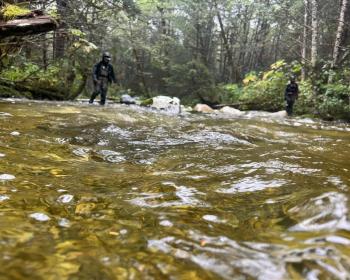
On November 12, 2010 the government of Canada finally formally endorsed the United Nations Declaration on the Rights of Indigenous Peoples. The government's official statement falls far short of actual endorsement, however, emphasizing that the declaration "does not reflect customary international law nor change Canadian laws" and further emphasizing Canada's objection to most of the major rights spelled out in the declaration.
By Brandi Morin (Cree/Iroquois)
Photos by Julien Defourny
By Danny Beaton (Turtle Clan Mohawk)
In Memory of Alicja Rozanska
Our Sacred Fires and Fire Keepers are needed more than ever. Pipe Carriers and Sweat Lodge Leaders can focus on healing our Elders and leaders, who will defend our children's future and their children's children.
By Ella Nathanael Alkiewicz (Labrador Inuk)
Five percent of Canada’s total population is Indigenous. Canadian Inuit, First Nations, and Métis are living, working, buying, and being alongside settlers, four-leggeds, winged-ones, and fins with the flora and fauna.
Over the past six months, Indigenous journalist Brandi Morin has travelled repeatedly to Ecuador, reporting on the impact of Canadian mining projects on the Indigenous Peoples who live there. Morin reports from the rolling hills outside the city of Cuenca, Ecuador, where Dundee Precious Metals, a Canadian company, plans to develop the underground Loma Larga gold mine.
By Brandi Morin (Iriquois, Cree)
Over the past six months, Indigenous journalist Brandi Morin has travelled repeatedly to Ecuador, reporting on the impact of Canadian mining projects on the Indigenous Peoples who live there. She reports from the rolling hills outside the city of Cuenca, Ecuador, where Dundee Precious Metals, a Canadian company, plans to develop the underground Loma Larga gold mine.
By Brandi Morin (Iriquois, Cree)
Government and industry will do whatever it takes to push through mining projects, but Indigenous opposition is strong in the heart of the Andes
By Brandi Morin (Cree/Iroquois), Photos by Ian Willms
Canada has finalized negotiations on a free trade deal with Ecuador, but claimed human rights protections ring hollow in light of alleged state repression.
By Brandi Morin (Cree/Iroquois), Photos by Ian Willms
By Brandi Morin (Cree/Iroquois)
The land guardian knows the intricate layout of his territory inside out. Mike Forbister (Ojibwe), like his father and grandfather before him, has memorized every vein of the complex English-Wabigoon River systems and navigates every nearby backroad and old hunting trail with ease. Together, with his colleague, Robby Williamson Jr. (Ojibwe), they spend their days monitoring the territory of their homelands at Grassy Narrows First Nation in Northwestern Ontario, Canada.
Trigger warning: This article discusses physical and sexual violence against Indigenous women. For immediate emotional assistance, call 1-844-413-6649. This is a national, toll-free 24/7 crisis call line providing support for anyone who requires emotional assistance related to missing and murdered Indigenous women, girls and Two-Spirited people. The Kuu-us Crisis Line provides 24-hour crisis services through the numbers below